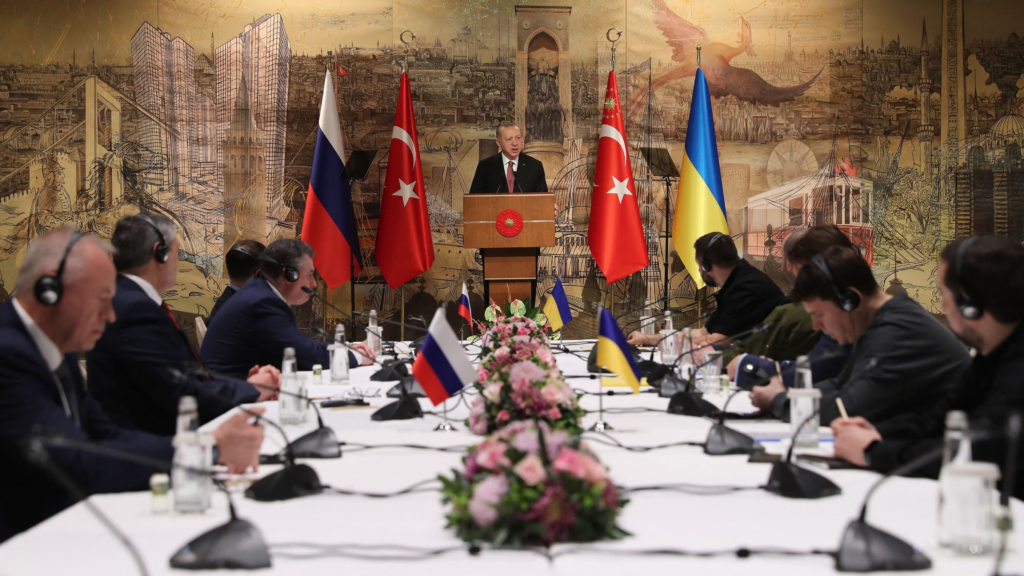Washington, D.C. – The United States has confirmed it will not take a direct role in mediating peace talks between Russia and Ukraine. In a statement released this week, the U.S. Department of State made it clear that while America supports diplomatic solutions to the war, it will not act as a mediator in any future negotiations between the two warring nations.

This announcement comes amid increasing global pressure for a diplomatic end to the ongoing Russia-Ukraine conflict, which began in February 2022 and has since caused devastating loss of life, widespread destruction, and major geopolitical shifts.
“We support efforts for peace, but the U.S. will not be the mediators in the Russia-Ukraine talks,” a senior State Department official told reporters on Tuesday.
Source: U.S. Department of State
Focus on Support, Not Mediation
According to the official statement, the Biden administration remains committed to supporting Ukraine through military aid, humanitarian assistance, and political backing. However, Washington believes that peace negotiations must be led by Ukraine and supported by international partners rather than being dictated by external powers.
“Any decision regarding peace must be made by Ukraine. We will not pressure them to negotiate or accept terms that go against their sovereignty,” the official added.
This position is in line with the U.S.’s long-standing support for Ukraine’s independence and territorial integrity, especially after Russia’s annexation of Crimea in 2014 and its full-scale invasion in 2022.
Zelensky’s Stand: No Talks Without Full Withdrawal
Ukrainian President Volodymyr Zelensky has repeatedly stated that any peace talks can only begin after Russian troops completely withdraw from all Ukrainian territory, including Crimea and the eastern Donbas region. Zelensky has also pushed for security guarantees from NATO and the European Union before considering any ceasefire agreements.
“Ukraine will not trade territory for peace,” Zelensky said during a recent press briefing in Kyiv.
Read more: Ukraine Presidential Office
The U.S. Department of State echoed this sentiment, stating that no third country, including the U.S., should pressure Ukraine into negotiations that compromise its sovereignty.
Peace Summits Without Russia?
Several international efforts have been made in recent months to initiate peace discussions. A peace summit is currently being planned in Switzerland, with Ukraine and its Western allies in attendance. Notably, Russia has not been invited.

While critics question the effectiveness of a peace summit that excludes one of the main parties in the conflict, Ukrainian and European leaders argue that it serves as a platform to unite global opinion against Russian aggression and to build a stronger peace framework.
“The goal is to align democratic nations toward a lasting solution,” said Swiss President Viola Amherd.
Swiss Government Announcement
The United States has supported the idea of the summit but has reiterated it will attend only as a supporter and not a facilitator.
Why Is the U.S. Stepping Back?
Analysts suggest that the U.S.’s refusal to mediate directly stems from several factors:
- Maintaining Ukrainian Autonomy: Allowing Ukraine to take the lead in negotiations prevents any perception of Western control or manipulation.
- Avoiding Diplomatic Backlash: If a U.S.-led negotiation fails, it could damage America’s credibility as a global leader.
- Focus on Military and Humanitarian Aid: The U.S. prefers to concentrate its resources on defense assistance, sanctions against Russia, and diplomatic support in international forums.
“Washington is playing a smart long game—support without overstepping,” said Dr. Lisa Carter, a foreign policy analyst at the Brookings Institution.
More from Brookings
Russia’s Reaction
Russia, on the other hand, has accused the U.S. and NATO of escalating the war by providing weapons and intelligence to Ukraine. Kremlin officials have dismissed Western-led summits as “political theatre” and have repeatedly demanded security guarantees from the West, including the neutralization of Ukraine.
“The West cannot play peacekeeper while fueling the conflict,” Russian Foreign Minister Sergey Lavrov said during an interview with Russian state media.
Kremlin Press Office
However, Russia’s own actions—such as missile attacks on civilian infrastructure and alleged war crimes—have isolated it diplomatically, making it difficult to find neutral parties willing to mediate talks.
Global Reactions
The global community remains divided. NATO countries support Ukraine’s right to self-defense and see Russia as the aggressor. On the other hand, countries like China, India, and Brazil have called for immediate peace talks and have offered to host negotiations, though with limited success.
“A peaceful solution must involve all parties, not just the West,” said Chinese Foreign Minister Wang Yi.
Read on: Ministry of Foreign Affairs of China
Some experts argue that the lack of U.S. mediation could open the door for more neutral countries to step in—if both Russia and Ukraine agree.
Future of Peace Talks
As the war drags on, the possibility of a negotiated settlement appears distant. The battlefield situation remains tense, with neither side showing signs of backing down.
Yet, as civilian casualties rise and international fatigue grows, the pressure for peace talks will likely increase. Whether they occur under the United Nations, through European platforms, or via emerging powers like China, one thing is clear: the U.S. will not be leading the charge.
Conclusion
The United States has made its position clear: it will back Ukraine, push for peace, and attend summits—but it will not serve as the mediator. Instead, the State Department believes peace must be driven by Ukraine and its allies, not imposed by outside forces.
While this approach respects Ukrainian sovereignty, it also leaves the world waiting for a breakthrough—one that may only come when both Moscow and Kyiv see more to gain from peace than from continued war.
For More Insights and Official Statements:
- U.S. Department of State
- Ukrainian Presidential Office
- Swiss Federal Council
- Brookings Institution
- Ministry of Foreign Affairs of China
Also read – Labor Day 2025: Do USA, UK, and Canada Get Off?






